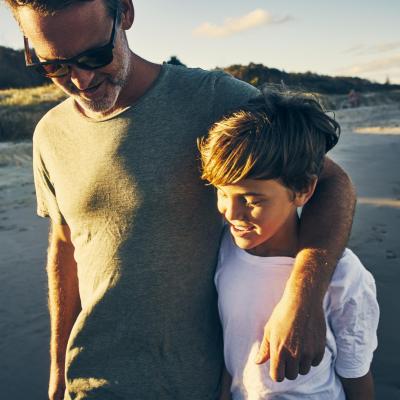
Navigating the challenges of mental health can be a daunting journey for parents, we are here to offer expert advice, resources and effective strategies to help your child build resilience and learn mental wellness.
As Australia’s largest health and wellness education charity, we have worked with over 800 schools, we have empowered more than 200,000 young individuals to embrace a healthy life, reinforcing physical, social, and emotional health and well-being.
Our resources for parents and carers are designed to offer practical solutions, insights, and assistance in fostering your child’s mental health. Join us in making a significant difference, ensuring a safer, healthier, and happier future for your child.

Our children are growing up in a changing world, faced with a barrage of media stories about climate change, cyberbullying and a volatile 21st century job market. But our kids also deal with everyday disappointments – such as falling out with a friend, losing their soccer match or getting into trouble at school. Research has found that optimistic people tend to be more resilient, so it’s worth trying to encourage your child to look for the silver lining in negative situations. It doesn’t mean pretending nothing is wrong. You can still acknowledge their concerns, fears and disappointments, but encourage your child to be adaptive and embrace change. Suggest a different way of looking at things that helps them focus on the positive rather than their worries or what has been lost.
For example: ‘‘I know you are upset that Jack is spending more time with Nicholas. Could you try spending lunch breaks with some of your other friends for the time being?”
Parents and significant adults have a big impact on how a child processes their experiences. It’s perfectly human to express frustration, sadness and disappointment at various times, and it’s healthy for children to see us experiencing these authentic emotions. However, we can try not to make mountains out of molehills in everyday situations such as missing a deadline or having to stand in the grocery queue. By demonstrating positive coping skills to children, we teach them valuable skills about dealing with failure, putting problems in perspective and taking hurdles in our stride.
For example: ‘‘I’m disappointed I’ve been made redundant from my job, but as a family, we will manage, and I know something even better is just around the corner.”


We all know the saying, a problem shared, is a problem halved. Kids do well when they feel supported. While it’s great to foster inner strength and self-reliance, research suggests that children who have a supportive relationship with at least one caring adult are better able to develop vital coping skills. This can be a parent, a coach or a teacher. The presence of an empathetic and supportive adult can help children process their feelings and cope with the effects of stress. So, cultivate a sense of belonging among friends, family and community.
Although it’s tempting to rescue our children from difficult situations, allowing them to solve problems for themselves, make their own decisions when appropriate and tackle new challenges builds confidence, self-esteem and resilience. It’s important to encourage children to take on responsibilities and develop a sense of autonomy and embrace calculated age-appropriate risks. Even simple tasks like letting a child feed the family pet, walk the dog, nurture a vegetable garden or pack their own bags for school camp, helps them develop a sense of self-command.
For example: ‘‘I know you are finding this assignment a bit tough, but if you do the recommended reading, you will find it much easier to write the essay.”


Just like adults, children need time out to daydream, be creative, listen to music and relax. Teaching children a few basic techniques related to breathing, mindfulness and meditation can be beneficial in dealing with stress or a busy schedule or distracting them from everyday anxieties. Likewise, exercise has a positive impact on both the body and mind and our ability to cope with stress. So, encourage kids to get outside and kick a ball, shoot some hoops, make up a dance or climb a tree. Not only will they have fun … you’ll be helping to build a happier, more resilient child.
After the bumpy ride of COVID, popular clinical psychologist and author Dr Judith Locke shares her strategies on how to help children reach their full potential at school.
Drawing on humorous anecdotes and her experience as a schoolteacher, counsellor, workplace trainer and sought-after psychologist, Dr Locke discusses some of the common pitfalls parents face when navigating the long school journey.
She says rather than expecting all children to be super achievers, parents should be more focused on building their child’s confidence and capability, with motivation, effort and ability often more important than the number of As on the report card.
Author of The Bonsai Child and The Bonsai Student, Judith talks about why parenting styles have changed, how to avoid over-parenting and the five essential skills your child needs at school and beyond – resilience, self-regulation, resourcefulness, respect and responsibility.
Neuroscientist Professor Selena Bartlett is an international trailblazer who has been studying the human brain for 30 years. She believes that by understanding how the brain works and how we respond to stress, we can help manage addictive behaviours like drinking, smoking and binge eating.
In this podcast for Life Education Queensland, coinciding with Queensland Mental Health Week, Professor Bartlett explores the link between food and mood, explaining why sugar is an addictive substance and how it changes the physical and chemical structure of the brain.
She also reveals how it’s possible to retrain our mindset through a few simple actions and habits. In other words, just like we tone our bodies at the gym, we can help our brains to become more resilient by changing thoughts, actions and habits that literally form new circuits in the brain.
Professor Bartlett believes that better brain health and fitness is the key to better mental health, and that modern neuroscience has the potential to help millions lead happier healthier lives.
Growing up today is a lot different to what it used to be.
Although we all want to raise happy kids, there are added pressures like social media, too much screen time, cyber threats and 21st century challenges beyond our control. Hugh van Cuylenburg, founder of The Resilience Project, says we can’t control the future and we can’t change the past, but we can improve our everyday outlook by practising the GEM principles – gratitude, empathy (or compassion), and mindfulness.
In part two of his chat for Life Education, Hugh talks about what drives his work, how to stop technology from making us less present, and the one simple activity that boosts happiness.
In a year of upheaval, Hugh’s relatable advice and humour is a welcome tonic for mental wellbeing.